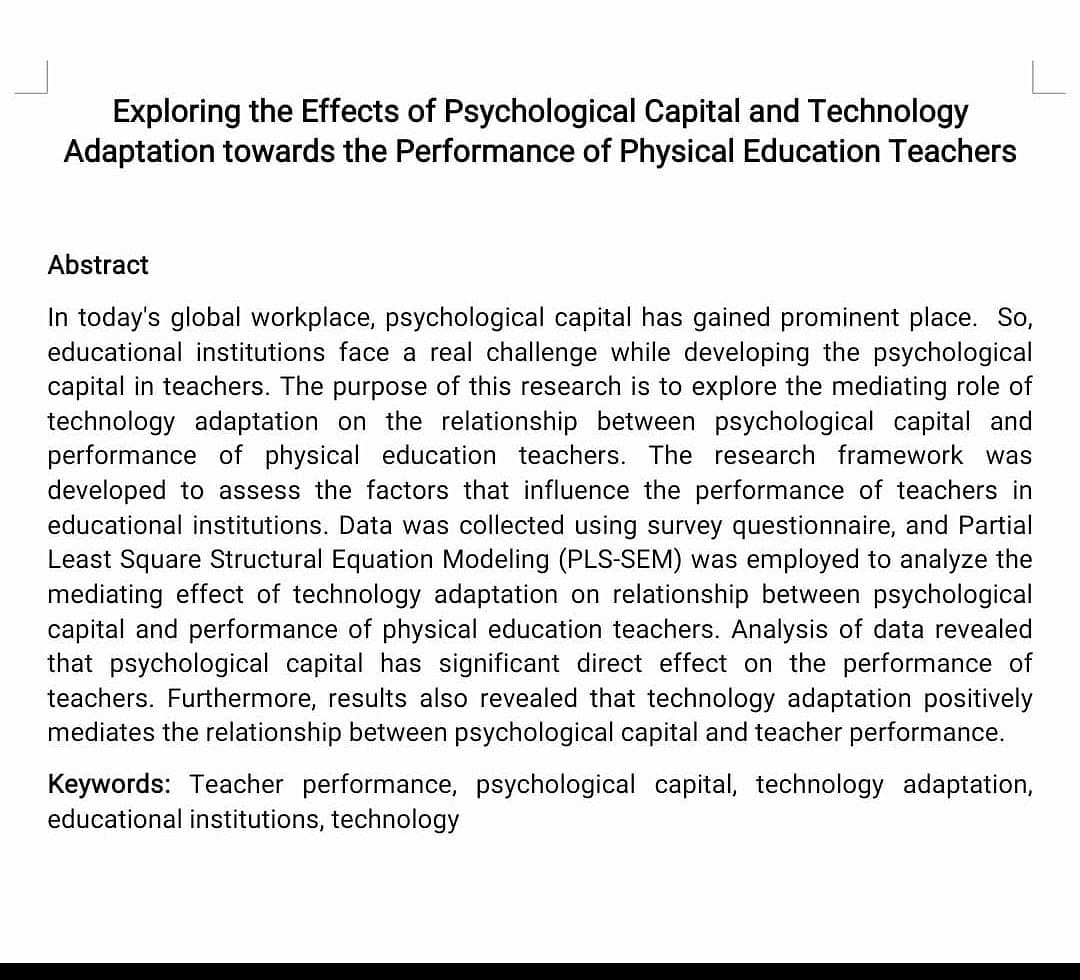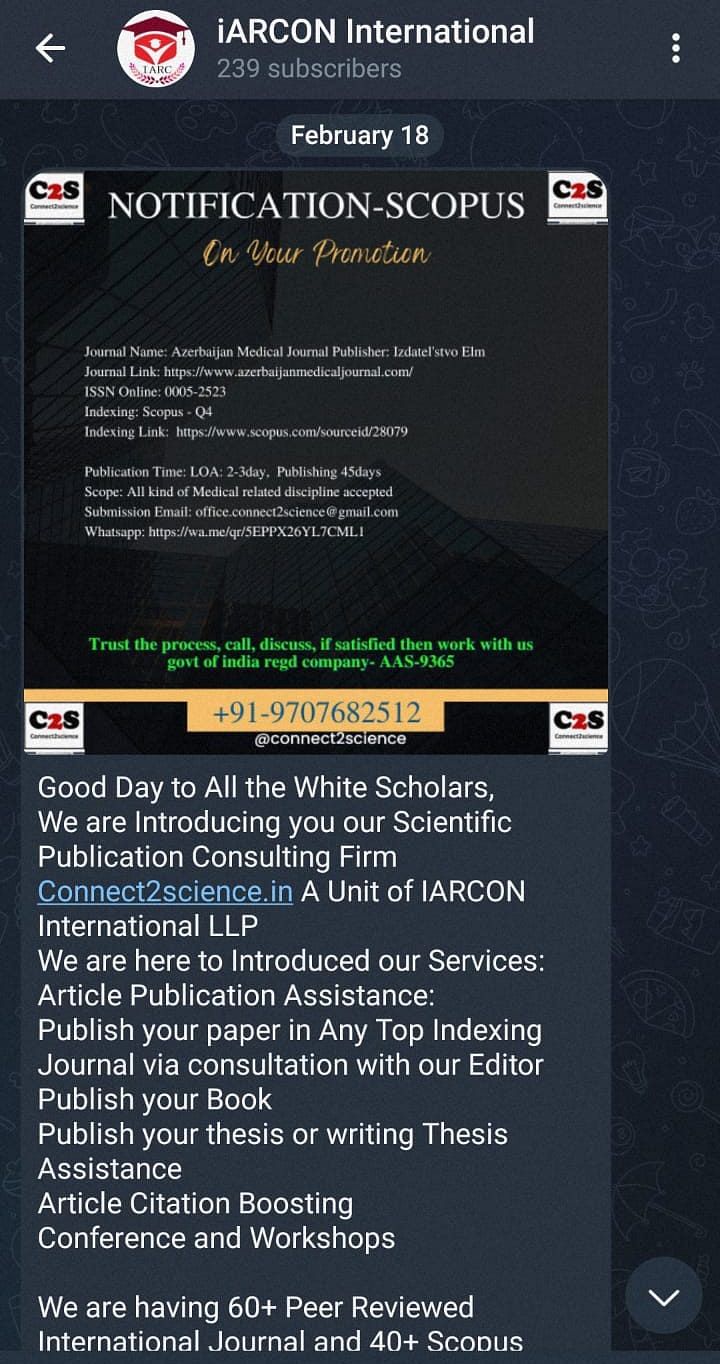New Delhi: For a few thousand rupees, Madhumita, a woman living in Belghoria, West Bengal, can get almost any research paper published in a Scopus-indexed journal. She and others like her are fixers for academics caught in the endless cycle of publishing and promotions, and PhD scholars desperate for their degrees.
Scopus, an index and citation database of journals and which claims to be the largest in the world is recommended for Indian academics. Presenting papers at conferences and getting published in journals is de rigueur, but the pressure is intense.
And this has led to the rise of an illegal industry of agents and touts who work in tandem with compromised peer-review boards to get substandard and sometimes completely fabricated research papers published in journals that are indexed by Scopus for as little as Rs 15,000. If unchecked, it has a long-term impact both in terms of adding uncertainty to what can be conclusively said as well as in destroying public trust in science and scientists to uphold the truth, warns Gautam Menon, professor of physics and biology at Ashoka University. It also ruins the credibility of Indian researchers in the international academic arena.
The International Journal of Early Childhood Special Education, Journal of Positive School Psychology, and International Journal of Control and Automation are among the hundreds of journals that claim to be Scopus-indexed. But their Scopus coverage has ended in the last two years. The papers they publish have no bearing on their scope. It’s a clear red flag.
Recent papers published in the International Journal of Early Childhood Special Education include, ‘Impact of Media Imperialism on Indian Television Industry’ and ‘Examining the Coverage of Women Related Crime News’. And some agents continue to take payments from academics to publish papers in this journal.
Since its Scopus coverage was discontinued in 2020, the International Journal of Control and Automation has published research on the ‘Styles, Traditions and Skills in the Fine Arts of Uzbekistan’ or ‘Psychoanalytic Foundations of Artistic Mastery or Patriarchy’.
The Indian Institute of Science’s journal Current Science also put out an advisory in July 2017 on its website after two fake websites with similar domain names www.currentscience.org and www.currentscience.co.in were found to copy its content and publish articles from researchers for a fee. Both fake sites are now defunct.
Authorships are up for sale and editors of lesser-known journals offer to publish papers for as little as a meagre amount of Rs 5,000. And for the right price, there are ghost writers who will write an entire research paper for a ‘client’. In all this, people like Biswas act as mediators between authors and journals.
“Some of the people who have approached me cannot speak the barely acceptable level of English required to teach a subject at the university level. Yet, simply by paying money, they get research papers in their name published and get promotions in their universities,” said Biswas.
A cog in this illegal underbelly of the academic sector, she acknowledges that what she is doing is unethical. “But I need to earn money.”
And there’s always a steady flow of clients. PhD students, for instance, need to publish at least two to three research papers in a Scopus-indexed journal before they can submit their thesis.
Also read: Is every scientific study genuine? BMJ throws light on ‘data fraud’ by countries, including India
The perfect petri dish
The University Grants Commission recommends a points-based system for appointment of faculty in Indian universities. As per the latest 2018 recommendations, a professor in the disciplines of Arts, Commerce, Humanities, Education, Law, Social Sciences, Sciences, Languages, Library Science, Journalism and Mass Communication requires 10 research publications and a ‘score’ above 120. For a publication in a peer-reviewed journal, an academic gets a score of 8 to 10. If the paper is published in a high-impact journal, there are additional points.
Menon calls for institutes and universities to consider where an academic is published, and not just how often.
“In more reputed universities that I have worked for, such predatory publishing was less prevalent because publishing in only the highest quality journals was prioritised,” he said.
But departments dictating where a journal paper gets published is not a viable solution.
“The head of the department (HoD) has no control over who publishes in what kind of journals. In fact, the HoD should not have that control at all. A good academic department must subscribe to the basic tenets of academic freedom,” said Amitabha Bandyopadhyay, head of the department of Biological Sciences & Bioengineering at the Indian Institute of Technology, Kanpur.
That said, HoDs can set the standard for “proper scientific temperament” within the department. “A certain bar is set which younger colleagues hesitate to violate. And that is the only way to ensure that quality of work is maintained,” Bandyopadhyay added.
But getting published in a reputed journal is a nerve-racking and frustrating process that can take anywhere between three to six months.
“And that’s the best-case scenario,” said Souvik Roy, a PhD scholar at the Indian Institutes of Science Education and Research (IISER) Kolkata. “I have seen people wait for up to two years for their paper to be accepted.” Roy too has three papers in the pipeline and he has been waiting for six months for their publication.
Even seasoned scientists have to jump through hoops to get their papers published. Roy’s PhD guide, Dibyendu Nandi, a top solar physicist with more than 50 publications to his name, continues to run into trouble with publishing his papers.
“If you do not have a large number of collaborators and foreign scientists as co-authors, it’s not easy to get through high-impact journals,” said Nandi.
The degrees, promotions and jobs that are at stake in an increasingly competitive academic industry offer the perfect petri dish to incubate an illegal publishing industry.
Also read: Why opening up science & encouraging communication is key to scientific progress
Thriving marketplace
Biswas stumbled onto this research papermill ecosystem during the Covid lockdown in 2021. She was going through a difficult pregnancy and was advised bed rest. Unwilling to let her master’s degree in computer science go to waste, she started looking for work-from-home opportunities. After going through various platforms, she came across a Birati-based publication house that had put out a call for jobs.
She got the job and it struck her as a little odd that her new employer did not meet her in person even after pandemic restrictions had been eased. Their communication was only via WhatsApp. Soon, she realised why.
“The job involved editing fake certificates for conferences that happened on paper, but nobody actually attended. I found it very unethical, and refused to do the work,” Biswas told ThePrint.
That was when her employer introduced her to the academic journal nexus. All she had to do was facilitate transactions between academics and students and pay-to-publish journals. But some of these journals operated under the cloak of legitimacy because they were, at some point, indexed in the Scopus database.
After a few months, Biswas decided to go independent. With an associate in Rajasthan who is part of several editorial boards of Scopus-indexed journals, Biswas can get at least four to five research papers published in Scopus-indexed journals every month. She earns a profit of Rs 1,000 on each of them paper published.
Since she started out, Biswas has evolved from being a mere facilitator. If an academic wants their paper written from scratch, Biswas has a PhD associate in Ghaziabad who can get the job done. Depending on the subject, she charges Rs 12,000 to 15,000 to get a paper written, and about Rs 15,000 to get one published.
Though Scopus-indexed journals are sought after, the ones that these paid-for papers are being published in have a low impact factor (IF), according to an international metric used to evaluate a journal based on the number of times its papers are cited by other researchers.
Academics don’t have to look too far to get published in journals. There’s a thriving marketplace with people hawking for their services.
How it works
Social media platforms like WhatsApp, Facebook and Telegram are rife with advertisements and discussion groups with touts selling ready-made papers or acceptance letters from Scopus-indexed journals.
‘New paper to join as authors,’ reads one advertisement for a paper titled ‘RNA AND kind of chemotherapy drug resistance’. It goes on to promise that the paper is in the ‘revision stage’ but will be accepted and published in a journal with an IF of 5.8.
For ready-made papers like these, academics can ‘book’ themselves for as co-authors of that paper. For one person to add their name on a paper, it can cost anywhere between Rs 7,000 to Rs 14,000 – depending on the position they book. Research papers written by multiple authors are often seen as more credible in the academia since it requires collaborative work. In one ad, the tout was selling the position of second author for $ 400, the third for $350, and the fourth and fifth authorship for $300 each.
Academics looking to be published in a journal have to provide a fully written research paper, following which touts working in tandem with journal editors get the papers accepted. In a span of just about 10 days, the research paper appears on the website of the journal, after which the individual has to pay up to Rs 15,000. Many of these journals only have an online presence, and if an academic does not pay up, their paper gets removed from the website.
Such networks are dubbed as peer-review rings in research communities. Last year, publishers Wiley and Hindawi identified these rings within their journals and retracted over 500 papers linked to them.
But the retractions do little to stamp down on the illegal industry online. A Telegram group chat had an advertisement for a paper titled ‘Impact of Psychological Capital and Technology Adaptation on Performance of Teachers’ in a post dated 15 November 2021. The paper with the same text and abstract was later found published in the Journal of Positive School Psychology in June 2022. The journal claims to be Scopus-indexed, but the Scopus website has no record of it.

“There are several professors—from editorial boards of different journals—who are in this business to earn a few quick bucks,” Biswas alleged.
These journals crop up in the advertisements posted on social media groups. These include but are not limited to Acta Biomedica, European Chemical Bulletin and the Pakistan Heart Journal. And one publication, Journal of Survey in Fisheries Sciences, even had Indian researchers on its editorial board.
The case of Journal of Survey in Fisheries Sciences
For an agreed-upon price, research scholar Manasi was promised that her research paper would be published in Scopus-indexed Journal of Survey in Fisheries Sciences, which had an Impact factor of 0.93. She sealed the deal on a WhatsApp group called ‘Research Paper Publication’ (sic) with over 160 members.
But when she raised doubts over the authenticity of her acceptance letter, the group admins assured her that they did not deal with fake journals. And sure enough, within a span of just a few days, the research paper was published in an online special issue of the journal. It was among a string of papers that had nothing to do with the scope of the journal’s area of expertise.
The incident shows that the peer-review process of the journal was compromised. Every paper submitted for publication has to undergo a review process that can sometimes take weeks. And no journal can guarantee that a paper submitted to them will be published.
ThePrint also found other websites such as https://estm.in/ as well as WhatsApp and Telegram groups that claim to assist researchers in getting acceptance letters from the Journal of Survey in Fisheries Sciences, which has over 50 scientists from several Asian countries as members of its editorial board.
Among those listed from India was one SK Joshi from ICAR-National Dairy Research Institute (NDRI) and a researcher from National Institute of Malaria Research (NIMR). Both don’t seem to exist. An NDRI spokesperson confirmed that there is no SK Joshi on its rolls, and NIMR is yet to respond to ThePrint’s email queries.
Two others mentioned as part of the editorial board were Waheid Khawar Balwan, head and senior assistant professor, Department of Zoology, Government Degree College Kilhotran in Doda, Jammu & Kashmir and N Senthilkumar from the Institute of Forest Genetics and Tree Breeding in Coimbatore. Balwan confirmed that he was on the editorial board, but claimed to be unaware about the latest publications. He refused to discuss the predatory nature of the journal. Senthilkumar denied having anything to do with the journal.
“I am not an editor for the journal,” he said.
Calls to the phone number listed by the Journal of Survey in Fisheries Sciences were not answered. ThePrint also reached out to the journal and its editors via email on 11 April. While one of the email addresses appears to be defunct, the other recipient is yet to respond.
For many academics, buying their way in is a painless solution.
Menon, who recommends quality over quantity, suggests that promotions and awards could be based on a small number of the candidate’s papers. “And an evaluation of their individual contribution to these papers.”
It’s one way to address the growing problem that muddies the research field.
Hijacked journals of India
Circumstances have created the perfect opportunity for a coordinated effort to dupe desperate scholars into publishing in ‘dodgy’ journals that are not covered by Scopus. Such publications are both functioning and discontinued, whose domain names are ‘hijacked’ by cyber criminals. They either take over the domain name of a discontinued journal, or create a similar-sounding one mimicking the legitimate journal.
On Scopus, the listing for the Journal of Otolaryngology – Head and Neck Surgery said it is a Springer Nature publication with International Standard Serial Number (ISSN) number 1916-0208. One Telegram group offers a chance to get easily published in this journal but the link it provides is to a Chinese journal website with a different ISSN number.
This website is hijacked, according to a list compiled by Anna Albakina, a research fellow at Freie Universität in Berlin, who has been working on identifying hijacked journals.
One Facebook group had advertisements for a journal called Res Militaris, which has been delisted by Scopus. However, touts across different platforms continue to sell papers in such journals as ‘Scopus-indexed’. Often, unsuspecting researchers also submit their papers to them without realising that they have been delisted.
According to Albakina, many of these clone websites are organised in one big network. Hijacked journals work with several broker companies from different countries that collect papers for publishing. This way, the journals are able to publish thousands of papers for months, she added.
“The majority of authors in these hijacked journals are from India,” she told ThePrint in an email.
“Many hijacked journals orient their business to scholars from India. But those hijacked journals, which were able to index unauthorised content in Scopus, publish papers from different developing countries, not only India (Indonesia, Russia, Uzbekistan, Iraq, Iran, etc),” she said.
The Indian University Grants Commission-Consortium for Academic Research Ethics (UGC-CARE) list of clone journals includes some of the detected URLs but not all.
The Indian scientific community is small with just a few thousand conducting high quality research, Bandyopadhyay said. “Now, with numerous bogus papers being published by Indian groups, international peers think that frivolous or fake publications and Indian scientific research are synonymous,” said Bandyopadhyay.
The fallout is that Indian research papers submitted to reputed international journals are subject to more scrutiny. “Our graduates won’t be considered seriously by the international community for inclusion in their research groups,” he added.
Organised groups
Several organised groups on social media platforms appear to be well-staffed to process a much larger number of papers. Among these include iARCON International—an Assam-based firm that claims to guide researchers in publishing papers.
However, from a Telegram group chat that ThePrint accessed, it appears that the group facilitates academics to publish in predatory journals.

The group also has its own journals, none of which are Scopus-indexed.
“Most of the authors who come to us do not know how to properly write or format a paper. We help them with editing and formatting,” Nasim Ahmed, director of iARCON, which processes some 200 papers every month. Their services costs anywhere from Rs 15,000 to Rs 40,000 per paper, depending on the type of journal and subject of the paper among other factors.
He claims to be connected with several editors of journals of publishers like Wiley and Elsevier. “So, we are able to ask them to fast track the process of publication for some papers.”
Ahmed has a team of technical subject experts who are well-versed with what kinds of articles a journal is looking for, which can help academics get their publications much faster.
“We can also help them incorporate the changes that the peer reviewer asks for. However, we can’t guarantee a publication,” he added.
Some of the posts on iARCON Telegram group do give an estimated timeline on how fast a paper can be published. This, Ahmed said, are special issues of legitimate journals.
“What a lot of academics do not understand is that these special issues are often not Scopus-indexed, but they publish thousands of articles at a low cost in a short time,” he added. Often, editors of these journals approach iARCON with deals. “A person from Indonesia told us they will publish each paper for Rs 5,000,” he said, without naming the journal.
While Ahmed denies providing ghost writing services, another Karnataka-based firm called Documentation Consulting Services (DCS) on its WhatsApp group provides fully written research papers, in which academics can buy a position as a co-author. Professor Karthik AS, who is listed as the Managing Director of the group, refused to comment on the matter. The DCS’s Telegram group put up a journal website domain name for sale – allowing an interested user to even create a hijacked journal.

Financial constraints, no guarantee
Not every student has the luxury of time. If a PhD student is unable to publish his research papers within five years, he/she might get an extension but without a fellowship.
“Some guides may support their scholars through grants, but not every scholar gets that support,” said Roy, who described the process of getting published as frustrating.
“You can’t really move on from the work until it gets published. There is constant back and forth with peer-reviewers and editors; it takes up a lot of your time and headspace,” he added.
What’s more is that every journal has a publishing fee, and those with open-access demand a premium because of wider viewership. Publishing in peer-reviewed Scopus-indexed journal through the traditional route can cost an author up to Rs 30,000.
“Can you then blame an Indian researcher? Why would they want to pay that much, go through the long wait of peer review with no guarantee of publication, when they can get published in a special issue for a fraction of the cost?” asked Ahmed.
This copy has been updated to reflect the correct designation of Waheid Khawar Balwan.
After the publication of this report, Dr Balwan reached out to ThePrint on 27 April to clarify that his name had been used by the Journal of Survey in Fisheries Sciences without his consent.
“I am not a part of the editorial board for the said journal,” he said, and added that his field of specialisation is human genetics. However, the journal continues to list Balwan as one of the editors. He said he has written to the journal requesting that his name be removed.
(Edited by Ratan Priya)



